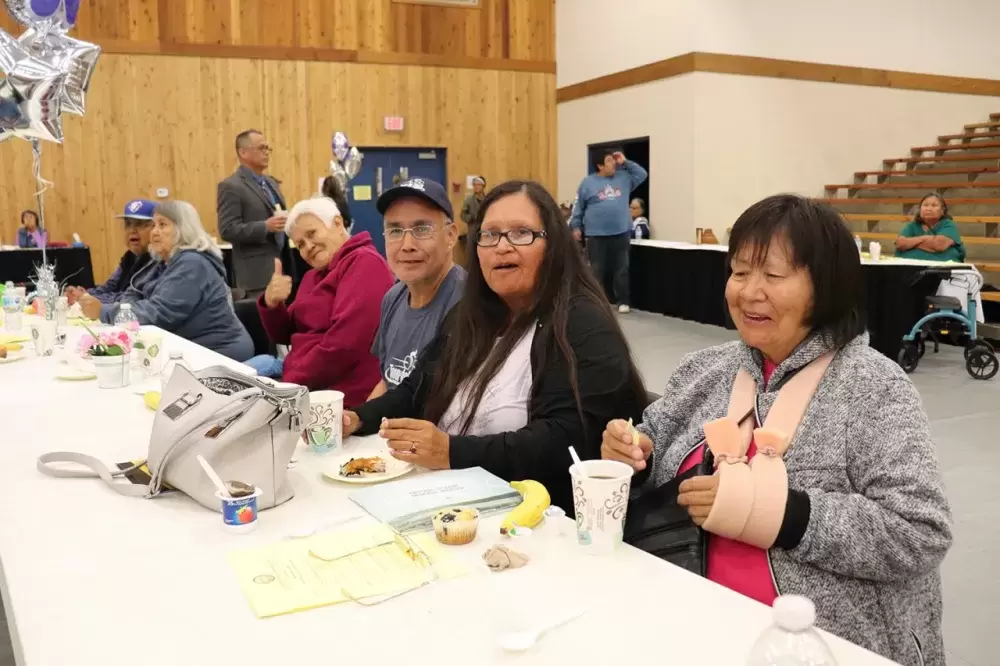As more Nuu-chah-nulth-aht enter their golden years, information about health conditions that come with aging becomes more important.
For that reason, organizers of the DAC (Disability Access Committee) fair brought in resource people to focuses on their interests on Oct. 3.
NTC Home Care Nurse Catherine Gislason advised that people should practice positive self-care when living with arthritis. Gislason, a registered nurse, serves as the NTC home care clinical leader and is certified in gerontology.
Arthritis self-care means staying active, eating healthy and managing pain.
According to Gislason, some seniors that suffer with arthritis pain are afraid to take doctor prescribed Prednisone due to fear of its adverse side effects. Prednisone is a steroid, a potent prescription and effective medication used to treat inflammatory types of arthritis. When the dose is too high, patients can suffer the side effects of thinning skin, acne, weight gain, or puffy face.
Gislason told the crowd that there have been advances in how Prednisone is administered; it’s now much safer to use that it used to be.
Another hot topic at the DAC fair was shingles and the availability of Shingrix vaccine. NTC Nurse Francine Gascoyne described shingles as a very painful rash, caused by the virus that causes chicken pox. It can strike at any age but most people that get shingles are over 50.
Shingles strikes those that had chicken pox – even as a child. The virus lays dormant in your body and it is believed it can be reactivated in those with a weakened immune system.
There is no way to know who will develop shingles later in life; only that one in three will get it. Usually it’s someone with a compromised immune system – someone dealing with diabetes, HIV/AIDS or cancer, for example.
Shingles is not life-threatening but it is painful. Symptoms include general illness, flu-like symptoms before a band of rash appears. The rash turns into clusters of blisters which can ooze. It can take weeks for the rash to fade away. If you suspect you are developing shingles in a sensitive area, like near your eyes, seek medical attention immediately, Gascoyne advised.
There is an antiviral medication that can shorten the course and severity of shingles if administered early enough.
Shingrix, the shingles vaccine, when administered in two doses is up to 90 per cent effective in preventing shingles. But it is expensive, costing more than $200 a dose, according one elder that paid for her vaccination. In recent weeks the First Nations Health Authority rolled out a shingles reimbursement program where Nuu-chah-nulth-aht may get reimbursed for the cost of their vaccination under certain conditions.
According to Gascoyne, if you are between ages 65 and 69 you can buy the vaccine from your pharmacist directly and send your receipt into FNHA for reimbursement. A prescription for Shingrix is not required. However, if you are outside the 65-69 age bracket and concerned about developing shingles your physician may recommend the vaccine. If you suffer from other health conditions that make you susceptible to shingles, Gascoyne suggests patients should get a note from their doctor recommending the vaccine.
Tom Curley noted that many elders cannot afford the upfront cost of the vaccination, reported to be about $215. Gascoyne suggested that some First Nations may offer assistance to their members for upfront cost. In this case, the reimbursement would go to the First Nation.
Some asked why there was such a small window of opportunity to get the vaccine free of cost. Gascoyne responded that studies have shown that the 65-69 age group is at high risk to contract shingles. An elder over 70 said he and his wife are worried that they could get shingles but fear they will not be reimbursed if they choose to protect themselves with a vaccination.
Ditidaht elder Nona Thompson suggested that the community health nurses in the villages coordinate a shingles vaccination day for the elders. This would reduce travel costs for those needing vaccines.
Gascoyne urged the people to use their voices and ask their doctors, nurses and other health care workers questions.
During an open mic session people talked about traditional forms of healing. Ben Lucas, a senior living in Port Alberni, raised a concern about conventional medication.
“I don’t trust them,” he said, “they can cause addictions.”
Lucas said he prefers to go to the river and use other traditional forms medicines.
“I would like to see our people get back to that,” he said.
Lucas suggested that each community should have someone knowledgeable about harvesting, preparing and administering natural medicines.
“I would like to know what to get, when to get it,” he said. “There should be people knowledgeable about ‘Indian’ medicine; that is how you look after people.”







